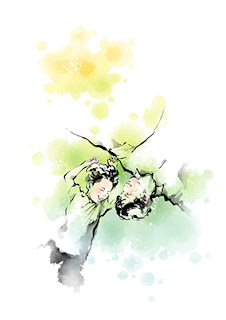In the Eyes of the Believer Column of the Catholic Times the writer reports on what it's like to have three generations living together.
They are watching not only the growth of their children but also the life of the elderly entering their twilight years. Her mother-in-law, who is over 80 years old, because of the pandemic is no longer going to the parish senior citizens' program and the neighborhood meeting of the elders has stopped, making her spend more time at home and has grown noticeably weaker.
The process of aging is increasing, more pain here and there, and the number of things that can be done is decreasing. She has expressed concern that she will not be able to move without other people's help soon.
When her mother-in-law told her that she has lived long enough and is ready for death, the children burst into tears as if their grandmother would be leaving them now. Children who have entered puberty complain that they don't agree with their grandmother's thoughts and standards, which are deeply rooted in Confucian values but just thinking about the moment when grandmother will no longer be with them brings great sadness. Parents have great difficulty communicating with teenagers these days, so it's not easy for the young to understand the values and mindset of the grandmother's generation, who was born in the Japanese colonial era and lived through the most difficult times, but love for each other overcomes all differences.
It is a great grace for her that three generations live together in her household. In Korea, single and two-person households account for 60% of the total population. Some people say it's difficult to live with the mother-in-law in the world these days, but in fact, thanks to her mother-in-law's "carrying them", they can live their social lives without major difficulties or worries while raising two children. And because there are adults in the house, the whole family moves more diligently and sincerely, and the habit of saving without throwing food and things away was ingrained. The wisdom of life that she learned living with her mother-in-law is a great legacy for her and the children.
Meanwhile, her own mother, remembers the whole family and prays for all, even if they don't live together, she is passing on the joy of faith. Her mother starts the day with prayer and even though she is over seventy years old, she is still busy working as a village head in the parish. She learned the life of faith by watching her mother take care of her neighbors who were in trouble, make delicious food, and always sharing with others. The mother's prayer and confession of faith, always thanking God for each day and the little joys of life, are proof of her great faith in the whole family. She is passing on a great legacy.
This year, Pope Francis celebrated the fifth anniversary of the publication of the Apostolic Exhortation Amoris Laetitia on the beauty and joy of love in the family. On the same day, the Pope launched the "Amoris Laetitia Family Year" which will conclude on June 26, 2022. The Pope's exhortation, "Joy of Love", states: "This is the plea of the elderly, who fear being forgotten and rejected. Just as God asks us to be his means of hearing the cry of the poor, so too he wants us to hear the cry of the elderly." Grandmothers and grandfathers are "living memories" of each family and "evidence of faith", and asks them, embracing the young together, to confront the "throw away culture".(see paragraphs 191-193).
The Pope often says that as capitalism intensifies, young people are driven to competition and the elderly are abandoned as useless and that the elderly and the younger generation should ally together and confront the logic of the world that judges only values based on ability and efficiency.
She hopes that the painful and sick life of old age will not be filled with misery, but with respect and joy as a natural journey of life. When her parents' lives are so respected, her own life will be respected, and the generations of young children will learn and make their own the dignity of life. She would like to express her love and gratitude to parents on Parents' Day and pray to God to wisely lead families to share their joy and love in good health for a long time.






